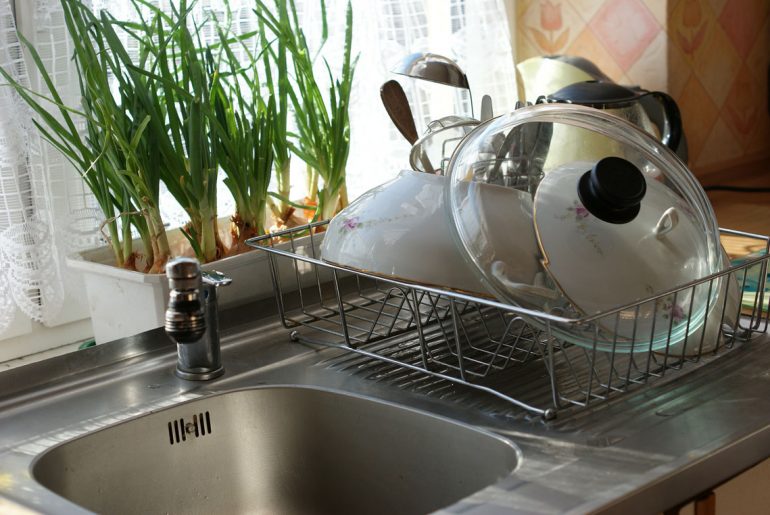If you’re lucky enough to have a garbage disposal, then you know how convenient it is.
While some households diligently scrape goo from pots and pans into the trashcan (not a pretty sight), you toss untold things into your sink without much thought.
Besides being a time saver, garbage disposals are much more environmentally responsible. Regular operation of a disposal unit only costs only a few dollars per year to operate and uses very little water. In return, you get to reduce the amount of food waste that ends up producing methane gas, while decomposing in your local landfill.
Instead, a garbage disposal moves your food scraps through the sewer system to be treated at the water plant where they will likely be recycled and reclaimed as clean water and fertilizer. Much of the food waste that goes down the drain is made up largely of water anyway, so you’re, in a way, returning it to its essence.
We like to think there is nothing our garbage disposals can’t handle. Yes, it has a powerful motor and blade, but like all good things, they too have their kryptonite.
Aside from the obvious unapproved items — spoons! — many vegetables are too fibrous and many starchy foods swell in size creating blockages. Here are a few other items you should think twice about before dumping down the drain.
1. Pits or seeds
Guaranteed, that peach pit isn’t making it through your disposal system. This goes for other fruit pits like cherries, avocados and apple cores, as well. If dropped by accident, turn your disposal off and retrieve, otherwise you’re just dulling your blade, creating a blockage and clogging your drain. It’s best to contribute these to you compost pile.
2. Coffee grounds
It may seems harmless since they’re so finely ground already, but coffee grinds tend to wear blades and create a sludge in your sewer system.
3. Egg shells
Some people swear egg shells sharpen the disposal blades, but in reality, the shell’s stringy membrane and wrap around the disposal’s inner parts and clog your pipes. Repurpose egg shells in compost for your garden instead.
4. Pasta, rice and potatoes
Starchy foods will swell when water is added. Even after they are ground up, they will keep growing and are guaranteed to make an expensive mess for a homeowner.
5. Bones
Turkey bones, chicken wings — steer clear of dropping these things in the sink. They won’t get ground up by the blades and will instead rattle around your drain.
6. Grease, fats and oils
If you’ve ever drained ground beef or bacon and let the grease sit for some time, you know what happens: solid fat. Now imagine this blockage in your drain pipe. Nuff’ said.
7. Celery and fibrous foods
Celery is the poster child for stringy vegetables but onion peels, corn husks and asparagus all fall in this category too. The fibers can get wrapped around the disposal causing the blades to break.
8. Non-food items
People stuff all kinds of non-food items down the sink and those create their own issues. Dental floss, cigarette butts, Q-tips, bottle caps and plastic pieces like a the milk gallon ring can make their unwelcome way down the drain. Do yourself and your plumber a service — Make sure your disposal is off, and scoop this extra stuff out of your drain. It doesn’t belong there.
Keeping your garbage disposal clean
Terry Mertz, a Pittsburgh-based plumber with more than 30 years of experience in the business and owner of Terry’s Plumbing, offers some advice on how to keep your garbage disposal in top spinning shape.
Moderation – For all of the things you can’t toss down the drain, there are many you can — just don’t overdo it. “‘Everything in moderation’ is the way I look at it,” said Mertz. “I know people who will throw a whole bowl of spaghetti in the sink then wonder what happened. But if it’s just the small scraps that you didn’t finish from your plate at dinner, it will probably be okay.”
Warm water – “Run warm water through your disposal for 20 or 30 seconds before, during and after you grind food,” said Mertz. This helps keep everything flush down the drain properly. You don’t want to cut this time short — food scraps can sit at the bottom of your disposal decaying and stink up your whole house. “People will empty their fridge into their sink and not run enough water, and it creates a big wad of sludge that can pretty easily clog the plumbing.”
Dish soap – A squirt of soap will help clean the inside of your disposal unit. Mertz recommends keeping the warm water running, and ideally adding some soap each time the disposal is used. “A little detergent, something like Dawn, can help break apart the sludge that gets stuck in your pipes. It also helps with smells and overall buildup on the unit.”
Ice cubes – Ice cubes can help knock off food residue from the blades. “Bad buildups that cause smells and wear and tear on the unit can often be alleviated, but the trick is to make sure you’re running enough water,” said Mertz. “So I would recommend ice cubes, with a little bit of soap or lemon while you keep the water running. This should keep the mush from building up.”
Tip: Make ice cubes out of lemon juice or vinegar or a biodegradable cleanser of your choice for a full unit refresher. Just be sure to label your special cubes as a “cleaner” so they don’t end up in your next drinking glass!




